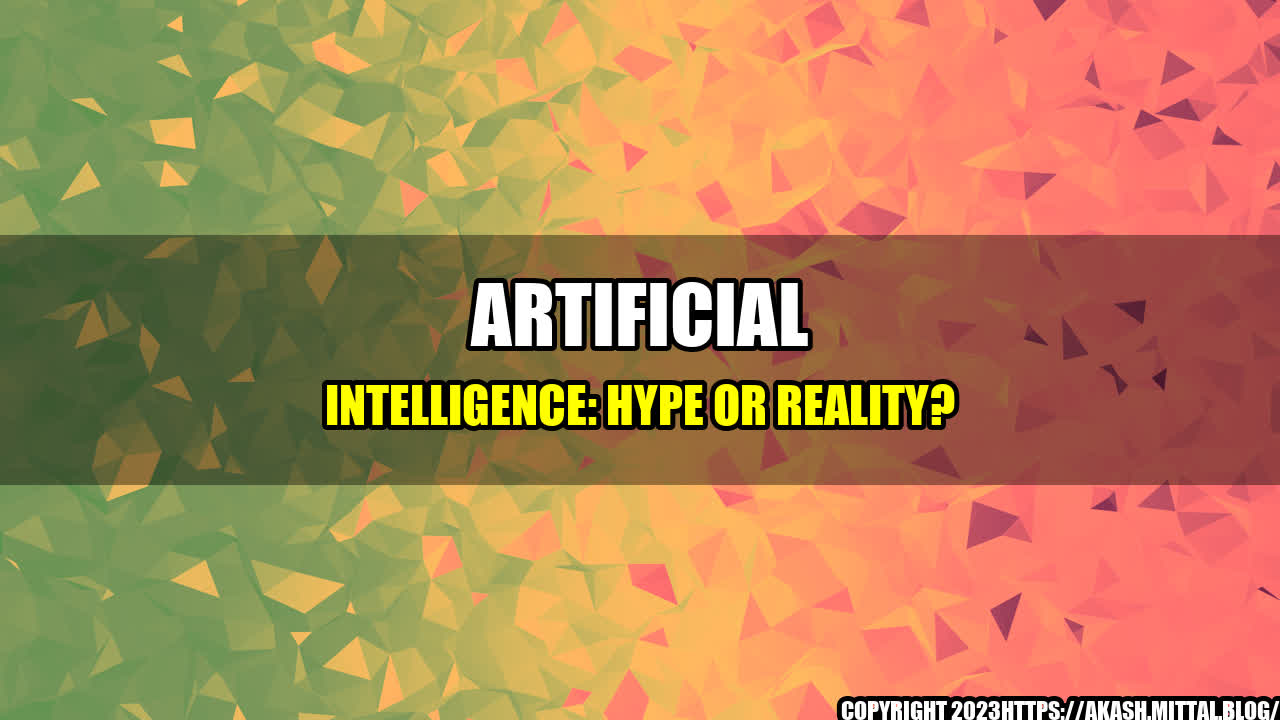
Have you ever imagined waking up to a world where machines can think and do things on their own? A world where you can take a back seat and let the robots do everything for you. Well, the reality is not too far from it. Artificial Intelligence or AI has come a long way, and there is hardly any aspect of our life that it has not touched. However, with technological advancement comes the hype that surrounds it and this is where the problem starts. While some consider AI as an essential breakthrough, others are skeptical of its output capability. In this article, we will explore whether AI is a hype or a reality and how it can impact our future.
Let's start with an interesting story. In 2017, a Chinese AI company showcased its first robot programmed to give sports commentary. The robot named "Rui" worked flawlessly as it analyzed the game played between France and Spain. Rui's abilities extended beyond sports commentary. It could read and write articles, present weather forecasts and give traffic updates. The innovative AI technology marveled spectators and the media alike, but it also raised a futuristic question in their minds- Is this the beginning of a new era where robots can replace humans in almost every field? The answer is quite complex but let us first try to decode what AI is.
Artificial Intelligence or AI is a branch of computer science that focuses on creating intelligent machines that can think and learn like humans. AI has evolved over time with the development of machine learning and deep learning, which enables computers to learn from data and recognize patterns. The applications of AI range from chatbots to self-driving cars, and it is expected that in a few years, AI will become an integral part of our day-to-day lives. However, the speed of AI's integration into society raises concerns as well.
Some people argue that AI is just hype, and it is not as advanced as it is portrayed. They feel that the technology is overhyped, and people perceive it to be more inclusive than it actually is. According to a study conducted by HackerNoon, only around 15% of companies are currently using AI. So, has the hype around AI surpassed its actual usage? At this point, it is unclear.
However, there are some unmistakable positive impacts of AI. The technology has the potential to augment human capabilities, automate tasks and increase efficiency. Companies like Amazon and Netflix are already leveraging AI technologies to enhance the quality of their services. Amazon's recommendation algorithm suggests products based on users' search history, and Netflix uses deep learning algorithms to personalize user experience. AI is also being used to develop smart farming techniques, to analyze data and identify farm patterns to increase yield and efficiency.
But, there are some negative aspects as well. As AI's capabilities increase, it raises ethical questions about job displacement. A report by McKinsey states that up to 375 million workers globally may need to change their job categories and acquire new skills by 2030 due to automation. Another concern is about bias in AI algorithms. AI algorithms are only as good as the data they learn from. Thus, if the data is biased or incomplete, the algorithms will inherit the same bias leading to a disparity that can impact several communities such as gender and race to access basic necessities like healthcare.
In conclusion, AI can be both hype and a reality. While some AI applications are game-changing, many are still in a nascent stage. The future of AI looks both promising and challenging. Personal anecdotes can testify to its brilliance, and examples of AI in our daily lives show how we can benefit from it, but we must remain vigilant about its long-term effects. As we move forward, AI's incorporation into society should be done in a responsible manner, which ensures that the benefits are evenly distributed.
To summarize the article, here are three essential points.
1. AI is not a hype but a reality. Even though only a few companies are currently using AI, several applications have already revolutionized how we work and play.
2. The ethical questions raised by AI cannot be ignored. Job displacement, bias, and social stratification are some of the issues that need to be tackled head-on.
3. The integration of AI into society should be done responsibly. Governments, companies and individuals need to work together to ensure the benefits are equitable and risks are mitigated.
References:
1. https://hackernoon.com/ai-hype-vs-reality-232c2ece71f5
2. https://www.mckinsey.com/featured-insights/future-of-work/jobs-lost-jobs-gained-what-the-future-of-work-will-mean-for-jobs-skills-and-wages
3. https://www.statista.com/topics/3175/artificial-intelligence-ai/
Hashtags:
#AI #TechnologicalAdvancement #DeepLearning #Robotics #ImpactOnSociety
Category: Technology
Curated by Team Akash.Mittal.Blog
Share on Twitter Share on LinkedIn